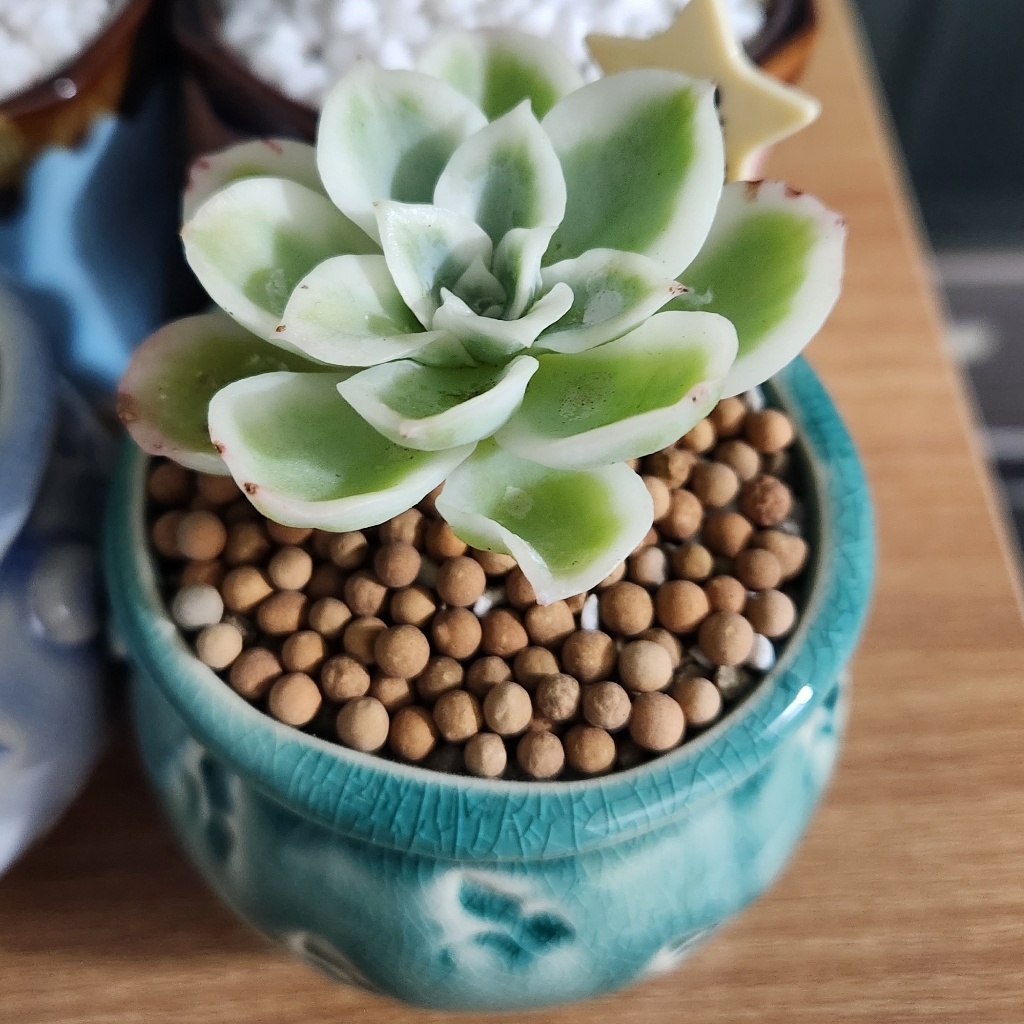How to grow and care for Echeveria 'Lemon Rose'
plant care guide about watering, fertilizing, trimming, repotting, cutting, propagating Echeveria 'Lemon Rose'
Echeveria 'Lemon Rose' 101 - Plant Care Instructions
Bright direct light
18C° ~25C°
Every 14 days
Botany Encyclopedia
Family : Crassulaceae
🌿 Photosynthesis
They use CAM (Crassulacean Acid Metabolism) photosynthesis, common in desert plants. This means they close their stomata during the day to minimize water loss and carry out photosynthesis at night. It's best to water them at night. However, they are sensitive to overwatering, so they should be kept in a well-ventilated environment without excess moisture.
Genus : Echeveria
🔖 Care Tips
In summer, pay attention to plant care. If your area is hot and humid, use shade cloths or ensure good airflow to regulate temperature. A white powder may form on parts of the plant other than the roots. This powder is a wax-like substance secreted by succulents to prevent moisture loss and protect against strong UV rays. While young leaves can re-secrete this powder if removed, older leaves do so more slowly. Therefore, it's best not to remove the powder.
🏝️ Habitat Conditions
Central and Northwestern America are very dry and sunny regions. Be careful not to overwater, as this can lead to excessive moisture.
🪨 Soil Mix
Plants that prefer dry environments should be planted in well-draining soil. Typically, succulents use a soil mix of potting soil and pumice in a 3:7 ratio. However, this ratio can vary depending on the situation and environment.
🌡️ Environment
Daytime temperatures should be 20-25°C, and nighttime temperatures should be 5-15°C. If it exceeds 30°C in summer, move it to a cooler place. In winter, maintain the temperature above 10°C. Keep the surrounding environment dry, not too humid.
👀 Characteristics details
Rosette plants have leaves shaped like a rose. When watering, ensure water does not collect on the leaves. Water around the leaves or ensure good air circulation after watering. These plants have succulent leaves that store water. If the leaves become wrinkled, it's a sign of water deficiency, so water them.
☀️ Light
Plants grow healthier with more light. If they lack light, their color may fade, so ensure they receive enough light. In summer, use a shade cloth to avoid strong sunlight.
💧 Water
Do not water too frequently. Water when the leaves become wrinkled or soft. In summer, growth slows, and in winter, the plant goes dormant, so it's best to water when the soil is completely dry. This plant closes its stomata during the day and does not transpire, so it's better to water at night. After watering, place the plant in a well-ventilated area.
🌱 Propagate
In spring, cut healthy stems and let them dry for a few days before planting them deep in soil without fertilizer. Avoid watering for 3-7 days after planting, as the stem may rot without roots. Gradually increase light exposure, starting with indirect light, and maintain high humidity and a temperature of 20-25°C.
🪴 Repot
Repot healthy plants every 2-3 years in spring, as they do not grow quickly. Water them 4-7 days after repotting, not immediately.
💊 Fertilize
Succulents do not require much fertilizer. However, if they are not vibrant or growing well despite sufficient light, it's good to apply a small amount of fertilizer in the spring. Avoid fertilizing immediately after repotting; wait 2-4 weeks before doing so.
🌺 Flower
Flowers bloom in spring and summer. Mature plants over a year old will bloom if they receive enough light. When grown indoors, they are less likely to bloom.
😵 Toxicity
Non-toxic and safe for pets and children.
water
How to water Echeveria 'Lemon Rose'
How often should I water?
check Echeveria 'Lemon Rose' Every 14 days if it needs water when it’s very cold (below 5℃), water less frequently
When do I need to water?
The soil should be at least 90% dry before watering again. this means about every 2 weeks in the warm season and about every 4 weeks in the cold season
Signs that it really needs water
leaves look a little wrinkled
Light & Location
How much light does a Echeveria 'Lemon Rose' need?

Bright direct light
Grow light
Light preference
Echeveria 'Lemon Rose' likes Bright direct light, Grow light day. The brighter the space, the better this plant grows.
Check if there’s an optimal place in your house!
This plant prefers
2K ~ 20K lux to thrive!
0
20K~
2K
20K
Temperature
Houseplants
-15
18~25℃
45
Plants that grow in the wild and those that grow indoors prefer different temperatures. If you grow Echeveria 'Lemon Rose' at home, make sure the temperature is 18~25℃.
Humidity
Ideal humidity
0
40~70%
100
Echeveria 'Lemon Rose' prefers humidity about 40~70%. If necessary, increase humidity by misting, humidifier.
Fertilize
Collective Knowhow
When should I fertilize?
Only when your plant is healthy
How frequently should I fertilize?
1-2 times in growing season. A pinch for a small pot.
Characteristic
The taxonomic classification of Echeveria 'Lemon Rose' is as follows. - Kingdom: Plantae, Phylum: Tracheophyta, Class: Magnoliopsida, Order: Saxifragales, Family: Crassulaceae, Genus: Echeveria, Species: Echeveria 'Lemon Rose'
| Taxonomy Name | Taxonomy Value |
|---|---|
| Phylum | Tracheophyta |
| Class | Magnoliopsida |
| Order | Saxifragales |
| Family | Crassulaceae |
| Genus | Echeveria |
| Species | Echeveria 'Lemon Rose' |
Is your plant sick?
Track what happened. We’ll let you know the cause and treatment shortly!





1:1 Expert Help
You’ll get professional feedback within 24 hours from an expert on our team.
feedback will include







